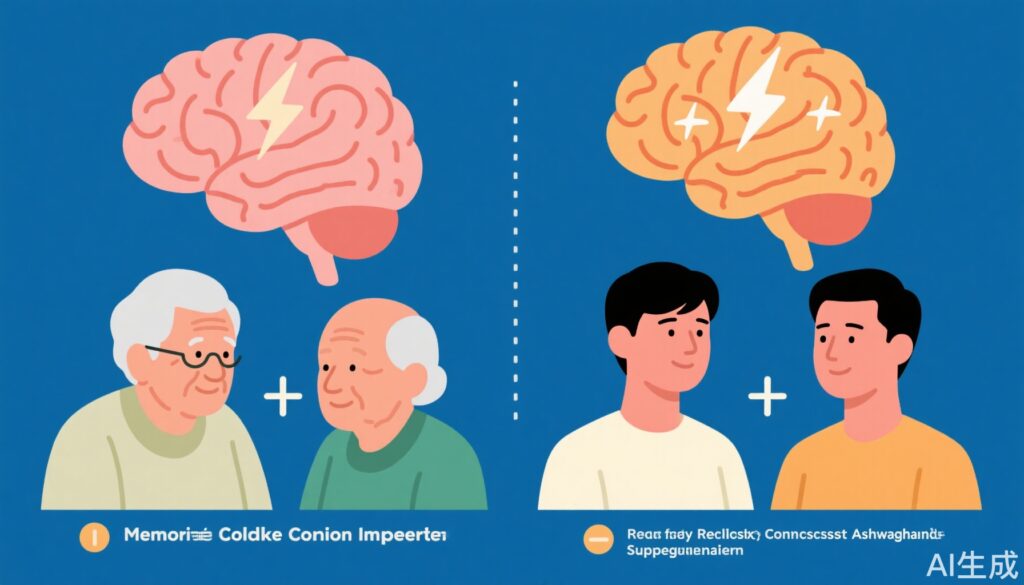Highlights
- Ashwagandha extract standardized with Sominone (Somin-On™) significantly improves memory and cognitive functions in adults with mild cognitive impairment (MCI).
- Liposomal ashwagandha enhances cognitive performance and reduces fatigue and tension in healthy young adults.
- Both studies report favorable safety profiles for ashwagandha supplementation.
Study Background and Disease Burden
Mild cognitive impairment (MCI) represents a transitional state between normal aging and dementia, characterized by memory and/or thinking problems greater than expected for age but not severe enough to interfere with daily life. Its prevalence increases with age, affecting roughly 10-20% of older adults globally, and is associated with increased risk of progression to Alzheimer’s disease and other dementias. The clinical burden is considerable, given the lack of approved pharmacological interventions for MCI and the psychosocial impact on patients and families. Thus, there is a critical need for safe, effective strategies to enhance cognitive function and potentially delay disease progression.
In parallel, cognitive enhancement and stress reduction in healthy populations—particularly younger adults—has become an area of interest, driven by demands for improved performance and mental well-being. Ashwagandha (Withania somnifera), a traditional adaptogen, has been explored in neuropsychiatric research for its anti-inflammatory, neuroprotective, and stress-relieving properties, yet robust clinical data in both MCI and healthy populations have been limited.
Study Design
MCI Study: Somin-On™
A randomized, double-blind, placebo-controlled pilot study enrolled 40 adults with MCI. Subjects were randomized 1:1 to receive either Somin-On™ (250 mg daily as standardized ashwagandha extract) or placebo for 60 days. Cognitive endpoints were assessed at baseline, 30 days, and 60 days using validated scales: Montreal Cognitive Assessment (MoCA), Mini-Mental State Examination (MMSE), Wechsler Memory Scale-III (WMS-III), and Shepard Mental Rotation task.
Healthy Adult Study: Liposomal Ashwagandha
A separate randomized, double-blind trial included 59 healthy young adults (mean age 22.7 years). Participants fasted overnight and underwent baseline blood sampling, COMPASS cognitive battery, and Profile of Mood States (POMS). They received either 225 mg of liposomal ashwagandha or placebo. Acute cognitive testing was repeated after 60 minutes, and supplementation continued daily for 30 days, followed by repeat assessments. Data were analyzed using repeated measures GLM and pairwise comparisons with 95% confidence intervals.
Key Findings
MCI Population: Somin-On™ Effects
Subjects treated with Somin-On™ demonstrated robust improvements on multiple cognitive domains:
- WMS-III: Significant gains in immediate memory, general memory, working memory, and visuospatial processing at both 30 and 60 days, outperforming placebo.
- Shepard Mental Rotation: Performance increased by 12.22% at 30 days and 31.67% at 60 days from baseline in the Somin-On™ group.
- MoCA: Scores improved by 7.83% at 30 days and 14.77% at 60 days over baseline, significantly greater than placebo.
- MMSE: Scores rose by 9.26% at 30 days and 19.21% at 60 days from baseline, again exceeding placebo improvements.
No significant adverse events were reported, supporting a favorable safety profile.
Healthy Young Adults: Liposomal Ashwagandha Effects
Acute and sustained supplementation (225 mg/day) yielded:
- Memory: Enhanced word recall and recognition, picture recognition accuracy, and improved reaction times.
- Attention and Vigilance: Faster and more accurate responses in choice reaction time, digit vigilance, and Stroop congruent word tasks.
- Mood: Reductions in subjective tension and fatigue as measured by POMS.
Differences between ashwagandha and placebo were statistically significant across several domains, with no notable safety concerns.
| Population | Intervention | Key Cognitive Outcomes | Mood Outcomes | Safety |
|---|---|---|---|---|
| MCI adults | Somin-On™ 250 mg/d | Immediate, general & working memory, visuospatial processing (↑ WMS-III, MoCA, MMSE, Shepard) | Not assessed | Good |
| Healthy young adults | Liposomal ashwagandha 225 mg/d | Word recall, recognition, attention, vigilance, executive function (↑ COMPASS) | Tension, fatigue ↓ (POMS) | Good |
Expert Commentary
The evidence from these randomized controlled trials supports the role of ashwagandha supplementation in enhancing cognitive performance in both clinical (MCI) and healthy populations. The observed improvements across diverse cognitive domains—memory, attention, executive function—are clinically meaningful, especially given the lack of approved treatments for MCI. Somin-On™ standardized extract appears particularly promising for older adults at risk of dementia, while liposomal ashwagandha may serve as a safe nootropic in younger individuals seeking cognitive and mood enhancement.
Limitations include relatively small sample sizes, short duration of follow-up, and reliance on cognitive test batteries rather than real-world functional outcomes. Furthermore, generalizability to broader and more diverse populations remains to be established. Longer-term studies with larger cohorts and biomarker-based endpoints (e.g., neuroimaging or fluid biomarkers) are warranted to confirm disease-modifying effects and mechanism of action.
Mechanistically, ashwagandha’s neuroprotective actions are attributed to its antioxidant, anti-inflammatory, and adaptogenic properties, with evidence of modulation of neurotransmitter systems and possible enhancement of synaptic plasticity.
Conclusion
These findings suggest that ashwagandha supplementation—whether as Somin-On™ for MCI patients or as liposomal formulations for healthy adults—may offer a safe, evidence-based approach to improving memory and cognitive function. While the results are promising, wider adoption will require confirmation in larger, longer-term studies, and integration into clinical guidelines. Clinicians should weigh individual patient characteristics and preferences when considering ashwagandha for cognitive enhancement.
References
1. Rai HP, Mishra DN. Effect of ashwagandha (Withania somnifera) extract with Sominone (Somin-On™) to improve memory in adults with mild cognitive impairment: A randomized, double-blind, placebo-controlled study. J Psychopharmacol. 2025 Apr;39(4):350-363. doi: 10.1177/02698811251324377. Epub 2025 Mar 18. PMID: 40099725.
2. Leonard M, Dickerson B, Estes L, Gonzalez DE, Jenkins V, Johnson S, Xing D, Yoo C, Ko J, Purpura M, Jäger R, Faries M, Kephart W, Sowinski R, Rasmussen CJ, Kreider RB. Acute and Repeated Ashwagandha Supplementation Improves Markers of Cognitive Function and Mood. Nutrients. 2024 Jun 8;16(12):1813. doi: 10.3390/nu16121813. PMID: 38931168; PMCID: PMC11207027.


